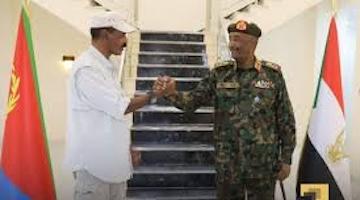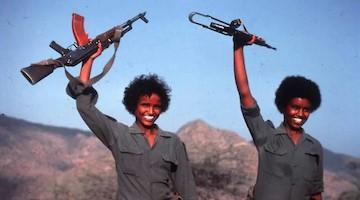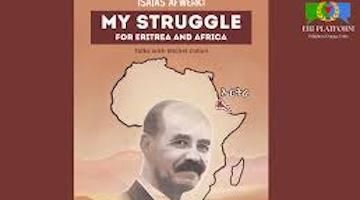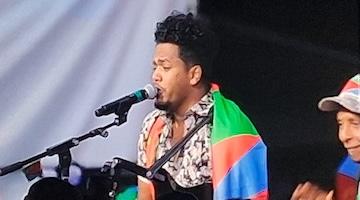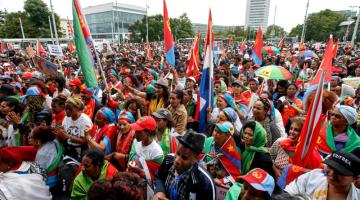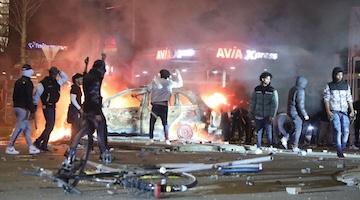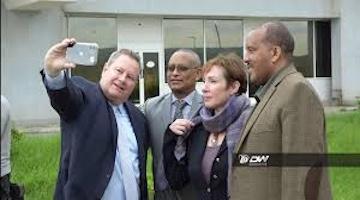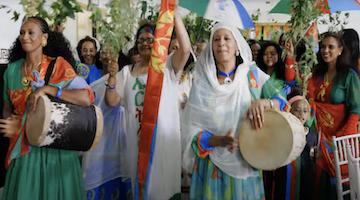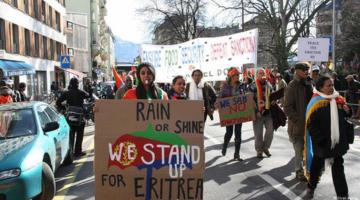Eritrean fighters during the 1961-1991 Eritrean War of Independence.
Eritrea remains true to the revolutionary ideals forged during its 30-year War of Independence.
On May 24th, Eritrea celebrated its 34th Independence Day. From September 1, 1961, to May 24, 1991, the Eritrean people waged a 30-year war to free themselves from the Ethiopian empire, first under the control of Emperor Haile Selassie and then under the Derg regime’s Mengistu Haile Mariam.
Eritrea was the first of five African nations now refusing to collaborate with AFRICOM, the US Africa Command. It has also refused to saddle itself with IMF or World Bank debt, but the African Development Bank has praised its progress and provided funding for one of its renewable energy projects and for its education initiatives.
I spoke to Eritrean-American journalist Elias Amare, who hosts his own YouTube channel, most of which is in the Tigrinya language, about Eritrea’s hard won independence.
ANN GARRISON: Elias, I know it’s difficult to summarize 30 years, but nevertheless, can you tell us the salient points we might understand about the Eritrean independence struggle, including the process that led to UN recognition?
ELIAS AMARE: That is a tall order, but let me start with some personal connection. I was born the year the armed struggle for national liberation was launched in Eritrea, in 1961, so my entire life has been within the struggle, first to liberate the land and, secondly, to defend the Eritrean sovereignty that was won with huge sacrifices, both human and material, during the 30-year struggle.
First we must bear in mind that the armed struggle was launched by Eritreans only when all peaceful political avenues had been closed to it. Eritrean demands and protests for national self-determination had just led to more deaths and more repression. In 1961, a band of armed men led by Hamid Idris Awate and inspired by the Algerian national liberation struggle finally launched the armed struggle.
Sectarianism and division along narrow, ethnic, and religious lines haunted the early movement until a progressive vision emerged. It was established that the leadership of the armed struggle had to be within Eritrea, on the battlefield, not sitting outside in comfortable zones like Cairo or Sudan, and that religious and ethnic divides had to be set aside for the sake of the national struggle.
The movement also prioritized popular democracy emerging from feudalistic culture, with political education, eradication of illiteracy, equality among fighters, and strict egalitarianism. Leaders and the rank and file had the same living standards; they shared the same accommodations, ate the same food, and received the same medical attention as needed. Their children got the same education.
There was popular democratic debate, criticism, and self-criticism. The emancipation of women was also prioritized, and that was extremely revolutionary within the patriarchal societies of that time.
This process gave birth to the Eritrean People's Liberation Front, and the egalitarian principles it established have carried through to this day.
On May 24, 1991, after the sacrifice of 65,000 heroic Eritrean fighters, the EPLF finally defeated the Ethiopian army, whose troops gave up and fled, with some even heading into Sudan.
The Eritreans never took any vendetta against them. They even gave them food and water along their way. All they wanted was a peaceful end to the war.
The Ethiopian Derg regime collapsed at the same time, and the Tigray People’s Liberation Front (TPLF) took over. Eritreans had fought with the TPLF in the interest of defeating a common enemy.
Once EPLF had established de facto control of Eritrean territory, it established a transitional government. Then, in 1993, there was a referendum on becoming an independent nation that was monitored by the United Nations and other international observers. There was no question that this was a free and fair election, and Eritreans voted for independence by 99.85%. The official declaration was delayed until May 24, 1993, because we wanted our independence to coincide with the day we defeated the Ethiopian army.
Within minutes of the declaration of independence, after the results of the referendum, five countries stepped forward– Egypt, Sudan, Italy, and the United States–to recognize Eritrea. The United States had opposed Eritrean independence since the 1940s, but it finally accepted the reality on the ground and became one of the first countries to officially recognize us. After that, the floodgates opened, and one country after another recognized.
On May 28, 1993, Eritrea was officially admitted as the 182nd UN member state. I was part of the Eritrean delegation that officially went to the United Nations when Eritrea was officially accepted as a free, independent nation, and it was the most moving experience of my life to see the Eritrean flag being raised in front of the UN after a 30-year struggle. Tears of pride, tears of joy, rushed down my face.
AG: I believe that meant that, in accordance with the UN Charter, the Security Council had passed a resolution to recommend recognition to the UN General Assembly, with at least nine votes and no vetoes from the five permanent members, and then the General Assembly had voted to recognize by at least a two-thirds majority.
EA: Yes, I believe that’s the procedure.
AG: OK, now another huge question. What has Eritrea achieved in 34 years of independence?
EA: Most of all it has sustained its status as an independent and sovereign nation. The vast majority of African states are neocolonial, proxy, or puppet states. Eritrea is the only African nation that has been truly independent for decades. Although it sounds simple, that is in itself a huge accomplishment. With the emergence of the Alliance of the Sahel States, I hope that more and more African states may join the movement for ending neocolonial relations, ending Africa's decades-long subservience and marginalization.
When I say that Eritrea is truly independent, I mean that it designs its own economic programs, not accepting the dictates of the Bretton Woods institutions, the World Bank and the IMF. It charts its own economic development path and undertakes its own development projects. It rejects foreign aid. It rejects the NGOs that proliferate all over Africa, the Trojan horses that cripple and paralyze African states.
It has been proven beyond a shadow of doubt that foreign aid is in fact devastating to Africa's development. Our president, Isaias Afwerki, has famously said that aid is like a drug; if you keep taking it, you become addicted.
The massive foreign aid that is dumped in Africa makes it more dependent, makes it poorer, instead of helping it develop. Africa is dependent on food aid year in, year out, even though its agriculture has huge potential.
Six decades ago, Africa fed itself. Today, for the most part, it cannot, but Eritrea can. It has prioritized the development of dams and irrigation, resolving that no drop of water will fail to irrigate and no drop will erode the soil.
I can point to other significant infrastructural achievements in road building, highway connections, education, and health. This progress was impeded because the US did not like the look of Eritrea’s independence. The US used Ethiopia’s TPLF regime as its regional “anchor state” for nearly 30 years, from 1991 to 2018, when it was overthrown in a popular uprising. In 1998 the US gave tacit support to the TPLF to launch a “border war” against Eritrea, which led to a devastating loss of life on both sides. The Eritrea-Ethiopia Boundary Commission created by the Algiers Peace Agreement ruled in Eritrea’s favor regarding the contested border regions, including the town of Badme, the casus belli of the conflict. However, Ethiopia, with US support, refused to accept its ruling.
Eritrea was also punished by UN sanctions initiated by the US from 2009 to 2018. They were based on wholly false claims that Eritrea had helped al-Shabaab terrorists. Eritrea also had a border conflict with Djibouti based on another manufactured lie.
The US imposed even more crippling sanctions, exclusion from the SWIFT system for conducting international financial transactions, during the 2020 to 2022 Ethiopian civil war in which the US backed their longtime proxy, the TPLF. The US has sustained these sanctions even though the Ethiopian war ended in November 2022.
Both rounds of sanctions severely hurt Eritrea’s economy, but nevertheless, it continued to make slow, steady progress. It eradicated illiteracy and provided free education from grade school through college. It drastically reduced the spread of communicable disease, such as malaria and tuberculosis. It ended the horrifying practice of female genital mutilation. It is corruption free.
We have begun to tap into our significant mineral wealth, but not without demanding fair ownership percentages, technology transfer, and training from foreign mining corporations.
AG: Regarding the freedom from corruption, I met a number of Eritrean cabinet ministers when I was there in 2022, and I didn’t see any driving fancy cars, wearing fancy clothes, or working in fancy offices. I also didn’t see any gross disparities of wealth or anyone begging on the streets.
EA: Yes, that is evidence that we have remained true to our original revolutionary ideals.
AG: What do you see in Eritrea’s future?
EA: Well, as you know, there is great instability and conflict in the Horn of Africa, where Eritrea remains an oasis of stability. It does and will continue to try to encourage regional movements to establish genuine sovereignty while at the same time standing up to Ethiopia’s new threats of military aggression.
Internally, within Eritrea, regardless of whether there is chaos and conflagration in the region, Eritrea will remain firmly focused on its own development. It will not be held hostage to external chaos agents, and will not veer from its path of national economic development and the improvement of life for all its people. It will stay the course.
Ann Garrison is a Black Agenda Report Contributing Editor based in the San Francisco Bay Area. In 2014, she received the Victoire Ingabire Umuhoza Democracy and Peace Prize for her reporting on conflict in the African Great Lakes region. She can be reached at ann@anngarrison.com. You can help support her work on Patreon.

